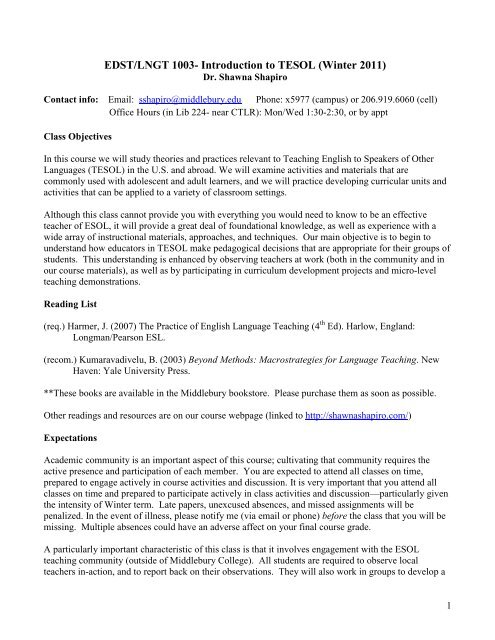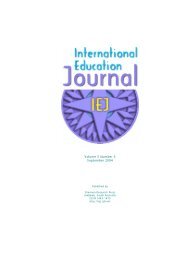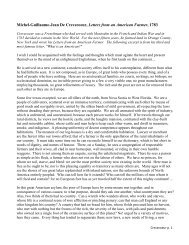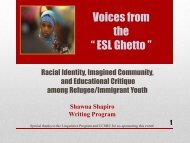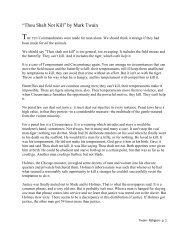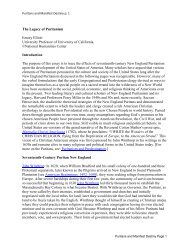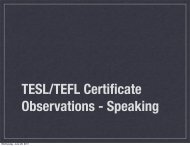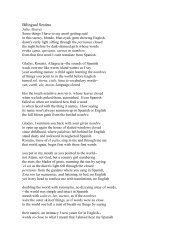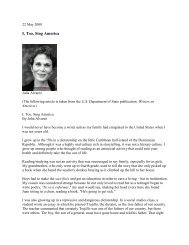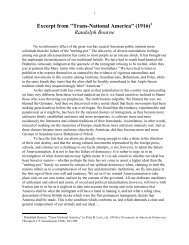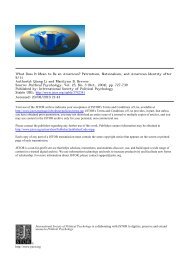Syllabus and Calendar - Shawna Shapiro
Syllabus and Calendar - Shawna Shapiro
Syllabus and Calendar - Shawna Shapiro
You also want an ePaper? Increase the reach of your titles
YUMPU automatically turns print PDFs into web optimized ePapers that Google loves.
EDST/LNGT 1003- Introduction to TESOL (Winter 2011)<br />
Dr. <strong>Shawna</strong> <strong>Shapiro</strong><br />
Contact info: Email: sshapiro@middlebury.edu Phone: x5977 (campus) or 206.919.6060 (cell)<br />
Office Hours (in Lib 224- near CTLR): Mon/Wed 1:30-2:30, or by appt<br />
Class Objectives<br />
In this course we will study theories <strong>and</strong> practices relevant to Teaching English to Speakers of Other<br />
Languages (TESOL) in the U.S. <strong>and</strong> abroad. We will examine activities <strong>and</strong> materials that are<br />
commonly used with adolescent <strong>and</strong> adult learners, <strong>and</strong> we will practice developing curricular units <strong>and</strong><br />
activities that can be applied to a variety of classroom settings.<br />
Although this class cannot provide you with everything you would need to know to be an effective<br />
teacher of ESOL, it will provide a great deal of foundational knowledge, as well as experience with a<br />
wide array of instructional materials, approaches, <strong>and</strong> techniques. Our main objective is to begin to<br />
underst<strong>and</strong> how educators in TESOL make pedagogical decisions that are appropriate for their groups of<br />
students. This underst<strong>and</strong>ing is enhanced by observing teachers at work (both in the community <strong>and</strong> in<br />
our course materials), as well as by participating in curriculum development projects <strong>and</strong> micro-level<br />
teaching demonstrations.<br />
Reading List<br />
(req.) Harmer, J. (2007) The Practice of English Language Teaching (4 th Ed). Harlow, Engl<strong>and</strong>:<br />
Longman/Pearson ESL.<br />
(recom.) Kumaravadivelu, B. (2003) Beyond Methods: Macrostrategies for Language Teaching. New<br />
Haven: Yale University Press.<br />
**These books are available in the Middlebury bookstore. Please purchase them as soon as possible.<br />
Other readings <strong>and</strong> resources are on our course webpage (linked to http://shawnashapiro.com/)<br />
Expectations<br />
Academic community is an important aspect of this course; cultivating that community requires the<br />
active presence <strong>and</strong> participation of each member. You are expected to attend all classes on time,<br />
prepared to engage actively in course activities <strong>and</strong> discussion. It is very important that you attend all<br />
classes on time <strong>and</strong> prepared to participate actively in class activities <strong>and</strong> discussion—particularly given<br />
the intensity of Winter term. Late papers, unexcused absences, <strong>and</strong> missed assignments will be<br />
penalized. In the event of illness, please notify me (via email or phone) before the class that you will be<br />
missing. Multiple absences could have an adverse affect on your final course grade.<br />
A particularly important characteristic of this class is that it involves engagement with the ESOL<br />
teaching community (outside of Middlebury College). All students are required to observe local<br />
teachers in-action, <strong>and</strong> to report back on their observations. They will also work in groups to develop a<br />
1
“curriculum kit” that meets one or more needs outlined by one of our partner teachers. Collectively,<br />
these activities comprise a project entitled “ESL Community Partners,” which is assisted by funds<br />
granted by the Alliance for Civic Engagement (ACE). More information on this <strong>and</strong> other aspects of<br />
the course will be provided in class.<br />
Grading Breakdown<br />
Linguistic Autobiography Paper (4-5 pp.)- 10%<br />
Curriculum Kit (including in-class presentation)- 20%<br />
Teaching Portfolio (including observation reports, microteaching reflections, <strong>and</strong> other work)- 25%<br />
HW Assignments (e.g. lesson plans, activities, interviews, analysis reports, quizzes, etc.)- 25%<br />
Participation, preparation, <strong>and</strong> professionalism- 20%<br />
Formatting for Written Work<br />
Unless specified otherwise, written assignments should be double-spaced, 12-point font (Times New<br />
Roman), with 1-inch margins. APA citation style is preferred, but other formats may be accepted upon<br />
student request.<br />
Communication <strong>and</strong> Support<br />
Communication <strong>and</strong> respect are very important to our course. I attempt to return all phone calls <strong>and</strong><br />
emails within 24 hours, <strong>and</strong> expect the same of my students. Your feedback is essential to the success of<br />
this course. I will give you multiple opportunities to reflect on the course, both in-class <strong>and</strong><br />
anonymously, but I appreciate hearing from you at any point about your needs <strong>and</strong> experiences. If you<br />
are feeling overwhelmed or frustrated, I hope you will let me know as soon as possible, so I can help<br />
you get the support you need.<br />
If you have a disability of any kind that might impact your studies, please communicate with me <strong>and</strong>/ or<br />
the ADA office, so that we can make a plan to accommodate you. See<br />
http://www.middlebury.edu/campuslife/diversity/ada/ for more information.<br />
2
Major Assignments <strong>and</strong> Deadlines<br />
1. Linguistic Autobiography Paper (4-5 pp.). Due: Before class (via email) on Wed 1/5.<br />
In this paper, you will reflect on your history as a learner/user (<strong>and</strong> current or future teacher,<br />
perhaps) of language (English <strong>and</strong>/or other languages). You will also make connections to course<br />
material.<br />
Questions to be addressed in this paper include the following:<br />
a. What language(s) have you studied, <strong>and</strong> how fluent are you?<br />
b. In what context(s) have you studied/learned those languages?<br />
c. What are your strengths <strong>and</strong> weaknesses as a language learner/user?<br />
d. What are some of the most (<strong>and</strong>/or least) effective strategies that you have experienced as a<br />
language learner? (both in the classroom <strong>and</strong> in textbooks/media, etc.)<br />
e. What role has “culture” <strong>and</strong>/or “identity” played in your language learning experiences?<br />
f. How might your language learning history impact you as a teacher of ESOL?<br />
g. What connections do you see between your experiences <strong>and</strong> course readings/discussion?<br />
2. Interview with ESOL Student (or Teacher). Due: Mon 1/10 (report [email, 2-3 pp. by 5pm]<br />
<strong>and</strong> debrief in class). Interview someone who has studied (or is studying) English as a<br />
second/foreign language. (e.g. international students, migrant workers, other immigrants). Ask him<br />
or her some of the questions you addressed in your Linguistic Autobiography Paper, or other<br />
questions that you are curious about. (NOTES: You may interview the student in English or in<br />
his/her L1. If you are interviewing a teacher, you might wish to include more questions about his or<br />
her background, experiences, challenges, <strong>and</strong> approaches).<br />
3. Teaching Observations <strong>and</strong> Reports. Due: Mon 1/17 (#1), Mon 1/24 (#2). At least one should<br />
be included in final teaching portfolio. You are required to observe at least two different teaching<br />
situations, for a total of approximately 4 hours of observation. Ideally, this will include one<br />
individual or small group setting, <strong>and</strong> one large group setting (see Observation Opportunities<br />
h<strong>and</strong>out). You will write two observation reports describing <strong>and</strong> commenting on what you<br />
observed. (More details forthcoming. Signups in-class on Tues 1/4).<br />
4. Micro-teaching Lessons <strong>and</strong> Reflections. Due: Lesson Plans due (paper- multiple copies) on<br />
day of presentation (See Course <strong>Calendar</strong>). Reflections due Wed 1/19 (#1) <strong>and</strong> Tues 1/25 (#2),<br />
via email. You will prepare two lesson plans including a 15-minute segment (1 or 2 activities) to<br />
facilitate with a small group (6-10) of your peers. You will receive feedback on your presentation,<br />
<strong>and</strong> will then discuss what you learned from each micro-teaching experience in a reflection paper.<br />
(More details forthcoming).<br />
3
5. Curriculum Kit Project. Due: To community partner(s) by Fri 1/21, if possible. Overview<br />
<strong>and</strong> short presentation due before last day of class. (See h<strong>and</strong>out with Curriculum Kit Ideas).<br />
You will work in groups (or individually) to develop a set of materials/resources that meet a<br />
particular need identified by one of our ESL Community Partners. The final “kit” will likely<br />
include both purchased <strong>and</strong> self-made materials, as well as an accompanying “Resource Guide” for<br />
teachers <strong>and</strong>/or students. Your “kit” should reflect best teaching practices, as well as wise use of<br />
funds (<strong>and</strong> other resources). These projects will be graded on professionalism, relevance, <strong>and</strong><br />
innovation. Each group member will submit a reflection describing what he or she learned in<br />
completing the project, <strong>and</strong> the group will present to the class in Week 3 or 4. If possible, the final<br />
kit should be presented in-person to the community partner(s).<br />
6. Teaching Portfolio. Due: Final submission by 5pm on Thurs 1/27. Other due dates during<br />
term.) The purpose of this portfolio is two-fold: First, it allows you to collect <strong>and</strong> reflect on much<br />
of the work you have done throughout the course, <strong>and</strong> helps me to know what you have learned.<br />
Second, it can serve as the starting place for a professional portfolio, which would be useful in the<br />
job market, should you decide to pursue a position in TESOL or a related field.<br />
This portfolio should include:<br />
I. A 2-3 page (single-spaced) cover letter that explains your teaching philosophy <strong>and</strong><br />
discusses how each artifact in the portfolio demonstrates that philosophy.<br />
(More details forthcoming).<br />
II.<br />
5 or more educational “artifacts,” including:<br />
a. One micro-teaching lesson plan <strong>and</strong> reflection<br />
b. One observation report<br />
c. A webliography (on a particular topic/theme)<br />
d. A unit plan with activities <strong>and</strong> lesson plans that would comprise 5 hours of instruction<br />
around a particular theme or objective (could be related to Community Partners project)<br />
e. One or more additional assignments or resources completed/created/collected during the<br />
course.<br />
Terms list for Harmer Chapters 1-4:<br />
Ch 1: TESOL / ESL / EFL / ESOL / ELF / ELL / ELT / ESP / TOEFL / EAP (please learn these ASAP- )<br />
Ch 2: form vs. meaning / accuracy vs. fluency / register / discourse community / coherence /cohesion /<br />
genre / syntax / parts of speech (N, V, Adj, Adv, Prep, Pron, Conj, article) / collocations /<br />
corpus/corpora / pitch / intonation / phoneme / alveolar ridge / hard/soft palate / vocal cords / consonant/<br />
vowel / voiced/voiceless / stress (in pronunciation) / paralinguistic features.<br />
Ch 3: behaviorism / noticing / language play (importance of). Ch 4: grammar-translation / direct<br />
method / audiolingualism / PPP vs. ESA / CLT / TBL / affect / input / output.<br />
4
Intro to TESOL (W 2011)- Tentative Course Schedule<br />
Date Topics Rdgs Assignments Due<br />
Mon<br />
1/3<br />
Overview of the field<br />
Personal language learning experiences<br />
Overview of syllabus <strong>and</strong> calendar<br />
Discuss Community Engagement Project<br />
Tues<br />
1 / 4<br />
Wed<br />
1/5<br />
Thurs<br />
1/6<br />
Second Language Acquisition (part I)<br />
English Language 101<br />
* Sign up for observations<br />
Second Language Acquisition (part II)<br />
Methodological Overview<br />
Take/discuss quizzes for Ch 1 <strong>and</strong> 2<br />
Underst<strong>and</strong>ing Learner Needs<br />
Intro to Curriculum/Lesson Design<br />
[Guest speaker: Joe McVeigh]<br />
* Choose Curriculum Kit Project<br />
(<strong>and</strong> form groups)<br />
Harmer<br />
Ch 1, 2<br />
Harmer<br />
Ch 3, 4<br />
Harmer<br />
Ch 5, 7<br />
Reading log for Ch 1 & 2 (begin<br />
studying for Wed)<br />
Bring draft/notes for Ling Autobiog<br />
Prepare for observation sign-up<br />
Linguistic Autobiography (4-5 pp.)<br />
Bring terminology quiz for Ch 1-2,<br />
4 copies.<br />
Prepare to take add’l quiz -Ch 3-4.<br />
(See terms list in syllabus)<br />
Bring activity/lesson plan<br />
(grammar/vocabulary)<br />
Profile of a group of learners<br />
Fri 1/7<br />
Field trip to Burlington HS (opt.)<br />
Mon<br />
1/10<br />
(Meet ___am at Adirondack Circle, or at BHS front<br />
office by ___am.)<br />
Curriculum/Lesson Planning (cont’d)<br />
Presentation of interview findings<br />
Micro-teaching<br />
Harmer<br />
Ch 6, 12<br />
Analysis of activity/lesson plan<br />
Interview Reports (email before<br />
class)<br />
Tues<br />
1/11<br />
Wed<br />
1/12<br />
Speaking <strong>and</strong> Pronunciation (part I)<br />
[Guest speaker: Joe McVeigh]<br />
Speaking/ Pronunciation (part II)<br />
Listening<br />
Micro-teaching<br />
Th 1/13 Academic vs. Communicative ESL<br />
Micro-teaching<br />
[Possible guest speaker/panel 1/13, 1/17 or 1/18]<br />
Micro-teaching I: Grammar/Vocab<br />
Harmer Bring speaking/pronunciation<br />
Ch 15, 20 textbook or lesson plan<br />
Prepare for short pronunciation<br />
assessment<br />
Harmer Analysis of speaking/pronunciation<br />
Ch 16, 18 textbook or lesson plan<br />
**Micro-teaching II: Pronunciation<br />
Online Sp/Pron/List Activities: Top 5<br />
**Micro-teaching III: Spkg/Listening<br />
Email Curriculum Kit plan <strong>and</strong><br />
purchase request to SS by midnight<br />
5
Fri<br />
1/14<br />
Mon<br />
1/17<br />
Field trip to Burlington HS (opt.)<br />
Reading, Writing <strong>and</strong> Vocabulary (part I)<br />
[Possible guest speaker/panel 1/13, 1/17 or 1/18]<br />
Harmer<br />
Ch 14, 17<br />
Observation Report #1<br />
Analysis <strong>and</strong> Activity list for a<br />
reading passage<br />
Afternoon: Check-in w/ SS about<br />
teaching obs. <strong>and</strong> Curriculum Kit<br />
Tues<br />
1/18<br />
Reading, Writing, Vocabulary (part II)<br />
Microteaching<br />
[Possible guest speaker/panel 1/13, 1/17 or 1/18]<br />
Harmer<br />
Ch 19 +<br />
online<br />
Writing activities: Top 5<br />
Micro-teaching IV: Reading/Writing<br />
Wed<br />
1/19<br />
English for Communicative, Academic,<br />
<strong>and</strong> Special Purposes<br />
Assessment <strong>and</strong> Testing (part I)<br />
Harmer<br />
Ch 22 +<br />
online<br />
Micro-teaching: Reflection #1<br />
Analysis of linguistic content<br />
Thurs<br />
1/20<br />
[Guest speaker (K.C. Carr)]<br />
Assessment <strong>and</strong> Testing (part II)<br />
Micro-teaching<br />
[Guest speaker- Judith Hertog)]<br />
Harmer<br />
Ch 8 +<br />
online?<br />
Afternoon: meetings w/ SS about<br />
Community Partners Project <strong>and</strong><br />
Teaching Portfolio<br />
Alternative assessment: Top 5<br />
Micro-teaching V: English for Special<br />
Purposes or Cultural Content<br />
Fri<br />
1/21<br />
Mon<br />
1/24<br />
Field trip to St. Michael’s College (opt.)<br />
Metacognition <strong>and</strong> Metalinguistics<br />
Cultural issues in TESOL<br />
TESOL <strong>and</strong> Social Justice (part I)<br />
Harmer<br />
Ch 23<br />
Observation #2 Report<br />
Analysis of a test/quiz<br />
Tues<br />
1/25<br />
Afternoon: Field trip to St. Michael’s<br />
College (opt.- by request)<br />
Classroom Management <strong>and</strong> Power<br />
Dynamics<br />
TESOL <strong>and</strong> Social Justice (part II)<br />
[Possible guest speaker- Prof. Martinez-Lage- 1/25<br />
or 1/26]<br />
Harmer<br />
Ch 9, 21?<br />
Micro-teaching: Reflection #2<br />
Advice column response<br />
Wed<br />
1/26<br />
Technology <strong>and</strong> other Resources<br />
[Possible guest speaker- Prof. Martinez-Lage- 1/25<br />
or 1/26]<br />
Harmer<br />
Ch 11<br />
Webliography (10 entries)<br />
Group presentations I<br />
Thurs<br />
1/27<br />
Professional Ethics <strong>and</strong> Continuing<br />
Education (Q/A)<br />
Course wrap-up<br />
Harmer<br />
Ch 24 +<br />
online<br />
Group presentations II<br />
Teaching Portfolio due by 5pm<br />
6
Curriculum Kit Project Ideas (based on requests from practicing teachers)<br />
Elementary School:<br />
1. Bilingual books for elementary school students: Portuguese, German, M<strong>and</strong>arin, possibly Urdu <strong>and</strong><br />
Vietnamese (esp. seasons/holidays, school culture, culturally relevant, etc.). Also requested if<br />
possible: Audio versions of bilingual books (on CD). [budget: $150. Creation of materials<br />
encouraged if possible.]<br />
2. Realia kits <strong>and</strong> flash cards (general <strong>and</strong> academic?) for elementary school students (esp. related to<br />
school themes <strong>and</strong> content- see above list) [budget: $100]<br />
3. Board games that incorporate relevant themes, vocabulary, <strong>and</strong> grammar points. [budget: $50]<br />
4. ELL Parent h<strong>and</strong>book/info kit (bilingual or picture-based)/ [budget by request]<br />
High School:<br />
5. Young adult- low-level/high interest books—individual copies <strong>and</strong> 1 or 2 class sets with self-created<br />
reading (or teacher’s) guides.[Budget $300. Purchase of used books encouraged. Recommended<br />
pub: Townsend, Penguin, Mason Crest]<br />
6. Test-preparation <strong>and</strong> other Study Skills: Guide for college-bound high school students [budget by<br />
request].<br />
7. Activities, resources, <strong>and</strong> materials for reinforcing the following Language Arts objectives<br />
[budget by request]:<br />
a. Literary terms <strong>and</strong> literature analysis<br />
b. The writing process<br />
c. Writing effective paragraphs<br />
d. Using transitions<br />
e. Other writing skills/objectives<br />
Adult <strong>and</strong>/or Mixed Levels<br />
8. Beginning Pronunciation activities (esp. physiology) for Spanish-speakers (e.g. flash cards,<br />
activities/games, webliography) [budget: $100 or more by request]<br />
9. Large Group/Mixed-level activities—esp. for migrant <strong>and</strong>/or refugee students [budget: $100]<br />
10. Bilingual literature (pub: Scholastic, Harper-Collins, Children’s Book Press) <strong>and</strong> other relevant<br />
resources/activities for Out-of-School Youth (OSY). Other internet resources for adult migrant<br />
education. [budget variable, depending on specific project. May look into mobile broadb<strong>and</strong>].<br />
11. Activities <strong>and</strong> resources for pre-literate students (esp. migrant workers <strong>and</strong> refugee students)<br />
[budget by request].<br />
7


